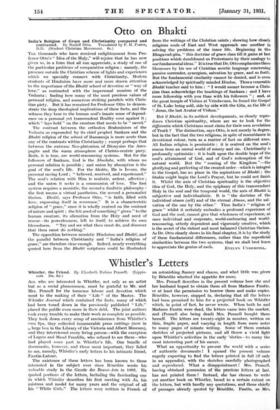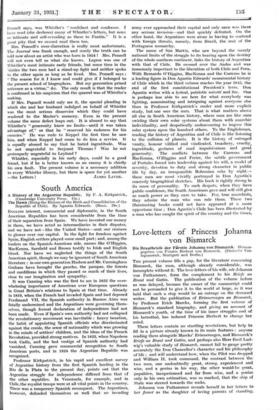Whistler's Letters
ALL who are interested in Whistler, not only as an artist but as a social phenomenon, must be grateful to Mr. and Mrs. Pennell for the immense labour and devotion which went to the making of their " Life " of the Master. The Whistler Journal which contained the facts, many of which had been toned down in the previously published " Life," placed the public even more in their debt. The joint authors took every trouble to make their work as complete as possible. They took down every scrap of reminiscence from Whistler's own lips, they collected innumerable press cuttings (now in a large box in the Library of the Victoria and Albert Museum), and they interviewed every living person—with the exception of Legros and Maud Franklin, who refused to see them—who had played some part in Whistler's life. One bundle of documents, however, and those most important, they failed to see, namely, Whistler's early letters to his intimate friend, Fantin-Latour.
The existence of these letters has been known to those interested in the subject ever since Benedite wrote his valuable study In the Gazette des Beaux-Arts in 1905. He quoted portions of the letters, including the fascinating one in which Whistler describes his first meeting with Jo, his mistress and model for many years and the original of all his " White Girls." The letters were written in French of
an astonishing fluency and charm, and what little was given by Benedite whetted the appetite for more.
Mrs. Pennell describes in the present volume how she and her husband hoped to obtain them all from Madame Fantin, or at least the permission to borrow them and make copies. Benedite, however, stepped in, declaring that all the letters had been promised to him for a projected book on Whistler which, in point of fact, he never wrote. When both he and Madame Fantin were dead, the letters came into the market, and (Pennell also being dead) Mrs. Pennell bought them herself. The letters are twenty-eight in number, written on thin, fragile paper, and varying in length from mere notes to many pages of minute writing. Some of them contain sketches of projected pictures, and all throw a vivid light upon Whistler's activities in the early 'sixties—to many the most interesting part of his career.
What an opportunity to present the world with a series of authentic. documents ! I opened the present volume eagerly expecting to find the letters printed in full (if only in an appendix), with the sketches carefully photographed and reproduced. What a disappointment ! Mrs. Pennell, having obtained possession of the precious letters at last, has not printed them 1 Instead, she has chosen to write yet another book on Whistler, based to a certain extent on the letters, but with hardly any quotations, and those chiefly of passages already quoted by B6nedite. Fantin, as Mrs.
Pennell says, was Whistler's " confidant and confessor. I have read (she declares) many of Whistler's letters, but none so intimate and self-revealing as these to Fantin." It is a great pity that we cannot read them too.
Mrs. Pennell's over-discretion is really most unfortunate. The Journal was frank enough, and surely the truth can be told now about an artist who was born in 1834 1 Mrs. Pennell will not even tell us what she knows. Legros was one of Whistler's most intimate early friends, but some time in the 'sixties the two men had a stand-up fight and neither spoke to the other again as long as he lived. Mrs. Pennell says : " The reason for .it I know and could give if I belonged to the present school of biographers. But my generation prized reticence as a virtue," &c. The only result is that the reader is confirmed in his suspicion that the quarrel was of Whistler's making.
If Mrs. Pennell would only see it, the special pleading in which she and her husband indulged on behalf of Whistler was the most serious disservice which they could have rendered to the Master's memory. Even in the present volume the same defect leaps out. It is absurd to say that Whistler's " generosity knew no limits—until it was taken advantage of," or that he "reserved his rudeness for his enemies." He was rude- to Keppel the first time he saw- him, and when Keppel had come to do him a service. It is equally absurd to say that he hated ingratitude. Was he not ungrateful to Serjeant Thomas ? Was he not grotesquely ungrateful to Leyland ?
Whistler, especially in his early days, could be a good friend, but if he is better known as an enemy it is chiefly his own fault. The present volume is a necessary addition to every Whistler library, but there is space for yet another







































 Previous page
Previous page